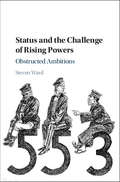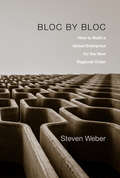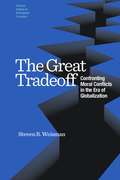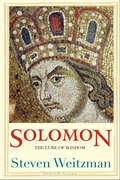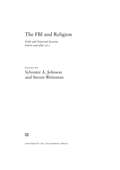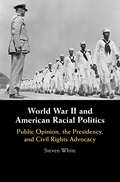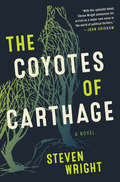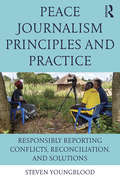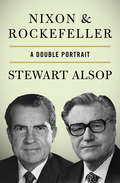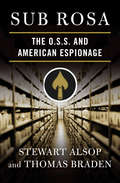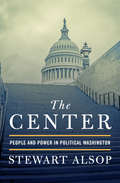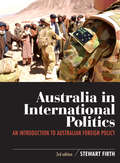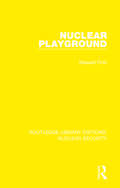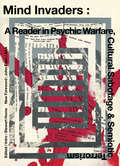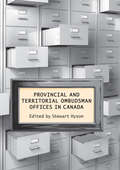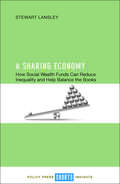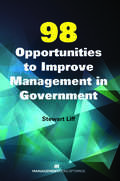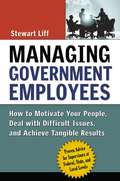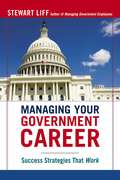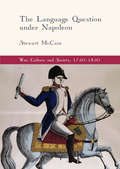- Table View
- List View
Status and the Challenge of Rising Powers: Obstructed Ambitions
by Steven WardThe rise of China and other great powers raises important questions about the persistence and stability of the 'liberal international order'. This book provides a new perspective on these questions by offering a novel theory of revisionist challenges to international order. It argues that rising powers sometimes seem to face the condition of 'status immobility', which activates social psychological and domestic political forces that push them toward lashing out in protest against status quo rules, norms, and institutions. Ward shows that status immobility theory illuminates important but often-overlooked dynamics that contributed to the most significant revisionist challenges in modern history. The book highlights the importance of status in world politics, and further advances a new understanding of this important concept's role in foreign policy. This book will be of interest to researchers in international politics and security, especially those interested in great power politics, status, power transitions, revisionism, and order.
Bloc by Bloc: How to Build a Global Enterprise for the New Regional Order
by Steven WeberGlobalization is taking a step backward. What, then, is the best way to organize a global enterprise? The key, Steven Weber explains, is to prepare for a world increasingly made up of competing regions with distinct rules and standards. This new condition could be more prosperous, but there will also be more friction and therefore more risk.
Third Thoughts
by Steven WeinbergOne of the world’s most captivating scientists challenges us to think about nature’s foundations and the entanglement of science and society. Steven Weinberg, author of The First Three Minutes, offers his views on fascinating aspects of physics and the universe, but does not seclude science behind disciplinary walls, or shy away from politics.
The Great Tradeoff: Confronting Moral Conflicts in the Era of Globalization
by Steven WeismanThe global financial and economic crisis that began in 2008 has blasted livelihoods, inspired protests, and toppled governments. It has also highlighted the profound moral concerns long surrounding globalization. Did materialist excess, doctrinaire embrace of free trade and capital flows, and indifference to economic injustice contribute to the disaster of the last decade? Was it ethical to bail out banks and governments while innocent people suffered?In this blend of economics, moral philosophy, history, and politics, Steven R. Weisman argues that the concepts of liberty, justice, virtue, and loyalty help to explain the passionate disagreements spawned by a globally integrated economy.
Solomon: The Lure of Wisdom
by Steven WeitzmanTradition has it that King Solomon knew everything there was to know--the mysteries of nature, of love, of God himself--but what do we know of him? Esteemed biblical scholar Steven Weitzman reintroduces readers to Solomon's story and its surprising influence in shaping Western culture, and he also examines what Solomon's life, wisdom, and writings have come to mean for Jews, Christians, and Muslims over the past two thousand years. Weitzman's Solomon is populated by a colorful cast of ambitious characters--Byzantine emperors, explorers, rabbis, saints, scientists, poets, archaeologists, trial judges, reggae singers, and moviemakers among them--whose common goal is to unearth the truth about Solomon's life and wisdom. Filled with the Solomonic texts of the Bible, along with lesser-known magical texts and other writings, this book challenges both religious and secular assumptions. Even as it seeks to tell the story of ancient Israel's greatest ruler, this insightful book is also a meditation on the Solomonic desire to know all of life's secrets, and on the role of this desire in world history.
The FBI and Religion: Faith and National Security before and after 9/11
by Steven Weitzman Sylvester A. JohnsonThe Federal Bureau of Investigation has had a long and tortuous relationship with religion over almost the entirety of its existence. As early as 1917, the Bureau began to target religious communities and groups it believed were hotbeds of anti-American politics. Whether these religious communities were pacifist groups that opposed American wars, or religious groups that advocated for white supremacy or direct conflict with the FBI, the Bureau has infiltrated and surveilled religious communities that run the gamut of American religious life. The FBI and Religion recounts this fraught and fascinating history, focusing on key moments in the Bureau's history. Starting from the beginnings of the FBI before World War I, moving through the Civil Rights Movement and the Cold War, up to 9/11 and today, this book tackles questions essential to understanding not only the history of law enforcement and religion, but also the future of religious liberty in America.
World War II and American Racial Politics: Public Opinion, the Presidency, and Civil Rights Advocacy
by Steven WhiteWorld War II played an important role in the trajectory of race and American political development, but the War's effects were much more complex than many assume. Steven White offers an extensive analysis of rarely utilized survey data and archival evidence to assess white racial attitudes and the executive branch response to civil rights advocacy. He finds that, contrary to conventional wisdom, the white mass public's racial policy attitudes largely did not liberalize during the war against Nazi Germany. In this context, advocates turned their attention to the possibility of unilateral action by the president, emphasizing a wartime civil rights agenda focused on discrimination in the defense industry and segregation in the military. This book offers a reinterpretation of this critical period in American political development, as well as implications for the theoretical relationship between war and the inclusion of marginalized groups in democratic societies.
The Coyotes of Carthage: A Novel
by Steven Wright“With this splendid debut, Steven Wright announces his arrival as a major new voice in the world of political thrillers. I enjoyed it immensely.” —John GrishamA blistering and thrilling debut—a biting exploration of American politics, set in a small South Carolina town, about a political operative running a dark money campaign for his corporate clientsDre Ross has one more shot. Despite being a successful political consultant, his aggressive tactics have put him on thin ice with his boss, Mrs. Fitz, who plucked him from juvenile incarceration and mentored his career. She exiles him to the backwoods of South Carolina with $250,000 of dark money to introduce a ballot initiative on behalf of a mining company. The goal: to manipulate the locals into voting to sell their pristine public land to the highest bidder.Dre arrives in God-fearing, flag-waving Carthage County, with only Mrs. Fitz’s well-meaning yet naïve grandson Brendan as his team. Dre, an African-American outsider, can’t be the one to collect the signatures needed to get on the ballot. So he hires a blue-collar couple, Tyler Lee and his pious wife, Chalene, to act as the initiative’s public face.Under Dre’s cynical direction, a land grab is disguised as a righteous fight for faith and liberty. As lines are crossed and lives ruined, Dre’s increasingly cutthroat campaign threatens the very soul of Carthage County and perhaps the last remnants of his own humanity.A piercing portrait of our fragile democracy and one man’s unraveling, The Coyotes of Carthage paints a disturbingly real portrait of the American experiment in action.
Peace Journalism Principles and Practices: Responsibly Reporting Conflicts, Reconciliation, and Solutions
by Steven YoungbloodLong-time peace journalist Steven Youngblood presents the foundations of peace journalism in this exciting new textbook, offering readers the methods, approaches, and concepts required to use journalism as a tool for peace, reconciliation, and development. Guidance is offered on framing stories, ethical treatment of sensitive subjects, and avoiding polarizing stereotypes through a range of international examples and case studies spanning from the Iraq war to the recent unrest in Ferguson, Missouri. Youngblood teaches students to interrogate traditional media narratives about crime, race, politics, immigration, and civil unrest, and to illustrate where—and how—a peace journalism approach can lead to more responsible and constructive coverage, and even assist in the peace process itself.
Nixon & Rockefeller: A Double Portrait
by Stewart AlsopA fascinating analysis of two of the most important figures in 1960s American politics, written during their battle for the GOP presidential nomination. Richard Milhous Nixon was one of the most controversial politicians in America&’s history: a California congressman, senator, vice president, and president who was forced to resign his position as US Chief Executive because of his role in the scandalous Watergate affair. Nelson Rockefeller was the scion of a phenomenally wealthy American family and longtime governor of New York State. In 1960 they were the leading contenders to win the Republican Party&’s nomination for president of the United States, one of whom would face the Democratic challenger, Senator John F. Kennedy, in November&’s general election. Written by acclaimed journalist Stewart Alsop during the heat of the political race to the Republican Convention, Nixon & Rockefeller provides a revealing, often surprising dual portrait of two giants of twentieth-century American politics. Alsop, an acknowledged Washington, DC, insider and one of the most esteemed political analysts of his era, explores the backgrounds, mindsets, and distinct personalities, as well as the strengths and failings of these two candidates vying for the highest office in the country. The author&’s intelligent and insightful views on the nature of a Nixon presidency versus a Rockefeller presidency make for fascinating reading in light of the political outcome that ultimately was and one that might have been.
Sub Rosa: The O. S. S. and American Espionage
by Stewart Alsop Thomas BradenA thrilling history of the Office of Strategic Services, America&’s precursor to the CIA, and its secret operations behind enemy lines during World War II. Born in the fires of the Second World War, the Office of Strategic Services, or OSS, was the brainchild of legendary US Maj. Gen. William &“Wild Bill&” Donovan, designed to provide covert aid to resistance fighters in European nations occupied by Germany&’s Nazi aggressors. Paratroopers Stewart Alsop and Thomas Braden—both of whom would become important political columnists in postwar years—became part of Wild Bill&’s able collection of soldiers, spies, and covert operatives. Sub Rosa is an enthralling insider&’s history of the remarkable intelligence operation that gave birth to the CIA. In Sub Rosa, Alsop and Braden take readers on a breathtaking journey through the birth and development of the top secret wartime espionage organization and detail many of the extraordinary OSS missions in France, Germany, Dakar and Casablanca in North Africa, and in the jungles of Burma that helped to hasten the end of the Japanese Empire and the fall of Adolf Hitler&’s powerful Reich. As exciting as any international thriller written by Eric Ambler or Graham Greene, Alsop and Braden&’s Sub Rosa is an indispensable addition to the literary history of American espionage and intelligence.
The Center: People and Power in Political Washington
by Stewart AlsopA portrait of Washington politics during one of the most turbulent eras in American history by the twentieth century&’s premier US government insider. During his three decades as a journalist and political pundit for the New York Herald Tribune and Newsweek magazine, Stewart Alsop covered many of the defining historical events of mid-to-late twentieth-century America, from the post–World War II boom and the Red Scare to the Bay of Pigs, the Cuban missile crisis, the Kennedy assassination, and the Vietnam War. In The Center, Alsop provides a perceptive, provocative, and marvelously erudite insider&’s view of the American political landscape of the 1960s, reporting from the beating heart of Washington, DC, the power center of the Western world. With an unblinking eye and razor-sharp intellect, Alsop cogently explores an arena of unbridled political power and influence that spans from the White House to Capitol Hill to the Supreme Court. He offers remarkable insights into the motivations and very human foibles of the key figures behind some of the century&’s most momentous events: Presidents John F. Kennedy and Lyndon B. Johnson, Secretary of Defense Robert McNamara and Secretary of State Dean Rusk, CIA Director Richard Helms and Supreme Court Justice Abe Fortas, among many others. The Center is a must-read for anyone interested in American politics and how the system got us to where we are today.
Skating on Stilts: Why We Aren't Stopping Tomorrow's Terrorism
by Stewart BakerStewart A. Baker, a former Homeland Security official, examines the technologies we love—jet travel, computer networks, and biotech—and finds that they are likely to empower new forms of terrorism unless we change our current course a few degrees and overcome resistance to change from business, foreign governments, and privacy advocates. He draws on his Homeland Security experience to show how that was done in the case of jet travel and border security but concludes that heading off disasters in computer networks and biotech will require a hardheaded recognition that privacy must sometimes yield to security, especially as technology changes the risks to both.
Australia in International Politics: An introduction to Australian foreign policy
by Stewart FirthThe world changed for Australia after the terrorist attacks on the US on September 11, 2001 and the Bali bombings of 2002. Security became the dominant theme of Australian foreign policy. Australian military forces remained in Afghanistan years later, opposing the terrorist threat of the Taliban, while hundreds of Australian troops and police worked with public servants to build the state in Asia-Pacific countries such as East Timor and Solomon Islands. The world changed for Australia, too, when the global financial crisis of September 2008 threatened another Great Depression. Meantime the international community made slow progress on measures to stem climate change, potentially Australia's largest security threat.In a newly revised and updated edition, Australia in International Politics shows how the nation is responding to these challenges. The book describes how Australian foreign policy has evolved since Federation and how it is made. It examines Australia's part in the United Nations, humanitarian intervention and peacekeeping. It analyses defence policy and nuclear arms control. It explains why Australia survived the global financial crisis and why the G20 has become the leading institution of global economic governance. It charts the course of Australia's climate change diplomacy, the growth of Australia's foreign aid, human rights in foreign relations and the rise of China as a great power.Written by one of Australia's most experienced teachers of international relations, Australia in International Politics explains Australian foreign policy for readers new to the field.'. one of the best books on Australian foreign policy that I have read in recent years' - Samuel M. Makinda, Australian Journal of Political Science
Nuclear Playground (Routledge Library Editions: Nuclear Security)
by Stewart FirthIn the late 1980s it was felt that World War III could start in the Pacific. Long regarded by the USA as an American lake, the Pacific was now a focus of competition between the superpowers. The USSR, whose nuclear-arms navy was limited to their north Pacific ports, now had a major new naval base at Cam Ranh Bay in Vietnam. In response to this new threat, the Americans were planning more urgently for nuclear war in the Pacific, adding to their own mighty arsenal in the region and taunting the Soviets with aggressive surveillance and military exercises. The Soviets did the same. For 40 years, Pacific Islanders have had cause to resent the use of their ocean as a nuclear playground: of the five nuclear powers, three – the USA, USSR and China – launched missiles into the Pacific for text purposes; two – the USA and Britain – exploded nuclear devices there but had stopped; and one, France, continued to test nuclear bombs in one of its colonies. Pacific Islanders now have cause to fear that the ocean is becoming a nuclear battleground. Originally published in 1987, this book tells the story of the nuclear men in the Pacific and of those people they ‘displaced’ and irradiated. It is also about what these people and their governments had begun to do in response. The nuclear issue had transformed the political landscape of Micronesia and the South Pacific in the 1980s, loosening the US grip and making the French increasingly unpopular. The people of these remote communities, largely forgotten or considered dispensable, had a nuclear past made for them. Now they want to make their own future.
Mind Invaders
by Stewart Home"The only movement to work consistently towards the death of history since the disbanding of the Situationist International has been the Global Neoist Network.Since 1979, Neoism has been defending the revolutionary gains made by the Situationists and Fluxus. The Neoists are the only group to have brought about the conjunction of nihilism and historical consciousness -- the two elements essential for the destruction of the old order, the order of history." You can never quite be sure to what degree Stewart Home, (or the Neoists from whom he noisily split, but under who's banner he long continued to write / agitate), is/was taking the p*ss. Decades of provocation, parody, backhanded agitation, ideological feuding, art, anti art, ideological feuding as both art and anti art, all of it written up, reported upon, exaggerated, added to, invented, and thrown into the face of late 20th / 21st century culture /subculture, first as polemic, eventually as farce. Mind Invaders was first published in 1997, culled from a panopoly of underported , unregarded, barely noticed sources : obscure zines, half finished manifesto's , loosely formed political strands starting to coalesce in shaded corners of the early web. Through force of will and a desire to exist, it pulled together a ramschackle, but somehow cohesive collection of currents that run deep through the post Situationist, anti-art, anti-trot, anti-spectacle European underground, tracing a definable lineage back from Dada > Bauhaus > Lettristes, through to the mail art movement of the 60's, loosely tied to Fluxus, and by it's very nature, a scattered, interconnected avant garde network, attempting to subvert the art-industrial complex by circumventing it, undermining commercial straitjackets by ignoring them. Techno paganism and Avant-bardism, 3 sided football, Five Year Plans for establishing community-based Autonomous space programmes around the world, psychogeographers planning to levitate . the Corn Exchange in Hulme...and most prominently,"The Luther Blissett Project, launched in Bologna, Summer '94, by an international gang of revolutionaries, mail artists, poets, performers, underground 'zines, cybernauts and squatters, collectively casting a long, long shadow.
Provincial & Territorial Ombudsman Offices in Canada
by Stewart HysonParliamentary ombudsmen are appointed to investigate citizens' complaints and to provide checks on government administrative activity. In Canada, there are ten provincial and territorial ombudsmen, each with mandates over the whole of the public service within their regions. Though each ombudsman presents an annual report on his or her activities, there has been little sustained evaluation of the position's impact or its effectiveness.In this collection, contributors describe and assess the performance of the ten ombudsman offices in light of their multiple and evolving functions. Ombudsmen both investigate citizens' complaints and direct them to already-existing agencies. They sometimes educate the public about administrative processes and initiate probes of systemic issues in need of amelioration or change. An important evaluation of a little-studied institution, Provincial and Territorial Ombudsman Offices in Canada offers background and theory, case studies, and perspectives on the emerging challenges for the office in the twenty-first century.
Australian Greens: From Activism to Australia's Third Party
by Stewart JacksonThe Australian Greens played a pivotal role after the 2010 federal election. It ensured the Gillard minority government went full term and won its first House of Representatives seat. But what do we really know about the Greens in Australia? Is the party really just an extension of the environment movement or a professional party, capable of influencing the major parties? This book examines the people who make the party tick. Uncovers the members and activists of the party. The Australian Greens: From Activism to Australia's Third Party asks whether the Greens has made the transition from a home for tree-huggers and alternative lifestylers to a party ready to work in Government.
A Sharing Economy: How Social Wealth Funds Can Reduce Inequality and Help Balance the Books
by Stewart LansleyBritain is a society increasingly divided between the super-affluent and the impoverished. A Sharing Economy proposes radical new ways to close the growing income gap and spread social opportunities. Drawing on overseas examples, Stewart Lansley argues that mobilising the huge financial potential of Britain’s public assets could pay for a pioneering new social wealth fund. Such a fund would boost economic and social investment, and, by building the social asset base, simultaneously strengthen the public finances. A powerful new policy tool, such funds would ensure that more of the gains from economic activity are shared by all and not colonised by a powerful few. This is a vital new contribution to the pressing debate on how to reduce inequality and combat austerity.
98 Opportunities to Improve Management in Government
by Stewart Liff98 Opportunities to Be a 100 Percent Better Government ManagerGovernment managers face myriad challenges every day. Whether dealing with an ever-shrinking pool of resources or the threat of sequestration and shutdowns, the government manager must work to maximize staff performance to meet mission objectives. Now, supervisors, managers, and leaders have some help. In this new book, veteran government leader, trainer, and author Stewart Liff offers practical and proven guidance aimed at helping people at every level of the organization. First-line managers as well as top agency leaders will find Liff's actionable suggestions invaluable in dealing with a broad spectrum of issues, including:+ People management+ Performance management+ Resource management+ Systems design+ Organizational politicsEach of the 98 opportunities—and the included strategies, tools, techniques, and tips to help you take advantage of them—is valuable in and of itself. Together they provide a complete guide to managing effectively in the federal workplace.Do your part to change government—one opportunity at a time!
Improving the Performance of Government Employees: A Manager's Guide
by Stewart LiffWith public scrutiny intensifying every day, optimizing the performance of government employees and departments is more critical than ever before. And just as in the private sector, the key for managers is to understand how different management systems perform individually and interact with one another. This book examines the roles and challenges of structural and technical systems, information and decision-making processes, rewards systems, and human capital management, and shows managers how to: deliver clear and consistent messages to all employees; position employees and units to provide the best possible service to the public; hold them accountable through clear expectations and measurable goals; work with a strong leadership team to maintain, adjust, and improve all procedures. Liff devotes a chapter to each system and discusses its impact on overall performance as well as how to work proactively and innovatively to implement changes that will make a big difference. Including real-world government case studies demonstrating dramatic change, the book is both an inspiration and a blueprint for substantial improvement within every facet of government work.
Managing Government Employees: How to Motivate Your People, Deal with Difficult Issues, and Achieve Tangible Results
by Stewart LiffManaging government employees presents unique challenges. Government managers may feel that stringent and convoluted regulations mean they "can't do that". Some others may use that perception as a crutch. But the truth for all of them is, yes, they can "do that" -- and they'd better. "That" means managing employees as proactively and decisively as their corporate counterparts, and holding their staffs, teams, and departments accountable for productivity and results. Managing Government Employees offers dozens of techniques for meeting the challenges and stressful situations supervisers face on a daily basis. Major topics include how to: * get maximum dedication and productivity from employees * improve results of poor performers and discipline or fire them when necessary * deal with union and EEO issues * cut through the red tape of government employment systems For managers frustrated by government bureaucracy, this book lets them know they have more power than they may think.
Managing Your Government Career: Success Strategies That Work
by Stewart LiffWorking for the government offers many advantages: great prospects for professional growth, job security, an attractive array of benefits, and the opportunity to help other citizens—but it also presents unique challenges. Managing Your Government Career gives current and future government employees powerful advice for starting out and maneuvering through their entire career. Based on the author&’s more than 32 years experience in civil service jobs, as well as his interactions with thousands of government employees, the book helps readers: decide whether working for the government is right for them • understand the differences between federal, state, and local levels • apply, interview for, and get the job they want • take advantage of the training offered • understand the culture • become familiar with local politics • make themselves valuable • develop the right mentors • fluidly transition up the ladder. Packed with indispensable guidance, this is a unique and highly strategic resource for anyone working in government.
The Complete Guide to Hiring and Firing Government Employees
by Stewart LiffNot only does government bureaucracy often make hiring a cumbersome, slow-moving process, but poor performers enjoy more protection from losing their jobs than their counterparts outside of government. With over thirty years’ experience as a federal government employee, insider Stewart Liff offers a solution to the government talent shortage--enabling government managers to cut through the red tape and take advantage of the best government employees out there. The Complete Guide to Hiring and Firing Government Employees also teaches readers the equally important skills of efficiently documenting and dealing with those who don't make the cut to ensure your team starts and stays strong. You’ll discover: how to take an anticipatory approach to recruiting; how to decide who to target, and where and how to advertise for open positions; how to screen and interview candidates; how to counsel a poor-performing employee; how to use progressive discipline; how to document a case and write a charge; how to develop internal political support; and much more. Bringing the best new people on board and weeding out the worst are both the most important and the most difficult tasks faced by any employer. For federal managers, the challenge is even greater. Filled with tried-and-true strategies, this step-by-step guide will equip you to continuously uphold, strengthen, and even grow an entire department of high achievers.
The Language Question under Napoleon
by Stewart McCainThis book offers a new perspective on the cultural politics of the Napoleonic Empire by exploring the issue of language within four pivotal institutions - the school, the army, the courtroom and the church. Based on wide-ranging research in archival and published sources, Stewart McCain demonstrates that the Napoleonic State was in reality fractured by disagreements over how best to govern a population characterized by enormous linguistic diversity. Napoleonic officials were not simply cultural imperialists; many acted as culture-brokers, emphasizing their familiarity with the local language to secure employment with the state, and pointing to linguistic and cultural particularism to justify departures from which what others might have considered desirable practice by the regime. This book will be of interest to scholars of the Napoleonic Empire, and of European state-building and nationalisms.
